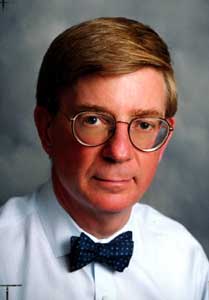This week Andrew Revkin of the New York Times lumped Al Gore in with George Will in an article on the dangers of climate change hyperbole.
Fair enough, if it were true.
Instead his article seems yet another example of how those trying to educate the public about global warming are held to a different standard in the media than so called “skeptics” – who often regurgitate long-discredited myths about climate science with apparent impunity.
Mr. Will’s article is an excellent case in point, containing a smorgasbord of the usual climate falsehoods that seem to crop up in the mainstream media like mushrooms. George Monbiot slams the claims in Will’s piece, pointing out the myths about global cooling, sea ice and global temperatures are not only at odds with the latest science, they are so ludicrous they almost deserve a laugh track.
Yet Mr. Will, like many so called “skeptics”, does not typically have to defend his claims. His job as a columnist is to be “provocative”. The individual errors can be discredited but like mushrooms, they can crop up again in the media for years to come.
Gore on the other hand, has devoted his life of late to raising awareness of climate change and arguably knows his material as well as many researchers. He also knows that his famous powerpoint presentation is constantly examined under a microscope for potential inaccuracies by the climate denial industry.
How these two reacted to the latest criticism is also telling. Gore pulled the slide in question linking extreme weather events to climate change and instead substituted data from the insurance industry – which seems utterly convinced of the link between climate change and expensive weather disasters.
George Will was not so responsive. According to the prestigious journal Nature, the Washington Post “repeatedly swatted away calls to issue a correction” on the many errors in Mr. Will’s piece.
Must be nice to never have to say you’re sorry.
Instead Mr. Will has published a new column that is even more erroneous than the first one. Will asserts again that arctic ice cover is about the same as in 1979. His source? Tech Daily – an electronic gadget blog that also seems to devote a strange amount of time to questioning climate science.
Here are some of the recent titles from their climate denying hit parade:
* Climate Report Downgrades Ice Loss; Media Reports Opposite
* Princeton Physicist Calls Global Warming Science “Mistaken”
* Defying Predictions, Sea Level Rise Begins to Slow
* Glaciers in Norway Growing Again
* Electric Car Sales in Freefall; Industry Risks Collapse
* How to Reduce Pollution by Drilling for Oil
* Study Finds Health Problems from Wind Farms
* Oxygen Depletion: The Next Great Environmental Scare
Desmog Blog readers will recall a critique we did last month on the Tech Daily’s baseless claims about sea ice. Yet George Will seems to put more faith in them, than the scientists who produced the ice data in the first place.
From the horse’s mouth, here is a statement from University of Illinois’ Arctic Climate Research Center on the sea ice “controversy”:
“We do not know where George Will is getting his information, but our data shows that on February 15, 1979, global sea ice area was 16.79 million sq. km and on February 15, 2009, global sea ice area was 15.45 million sq. km. Therefore, global sea ice levels are 1.34 million sq. km less in February 2009 than in February 1979. This decrease in sea ice area is roughly equal to the area of Texas, California, and Oklahoma combined.”
Mr. Will should refrain from writing about things he obviously knows nothing about. The Washington Post should not allow their credibility to be dragged through the mud by such shoddy research and writing.
And Andrew Revkin? The events of the last few days have well illustrated the stark difference between Al Gore and George Will.
Subscribe to our newsletter
Stay up to date with DeSmog news and alerts







